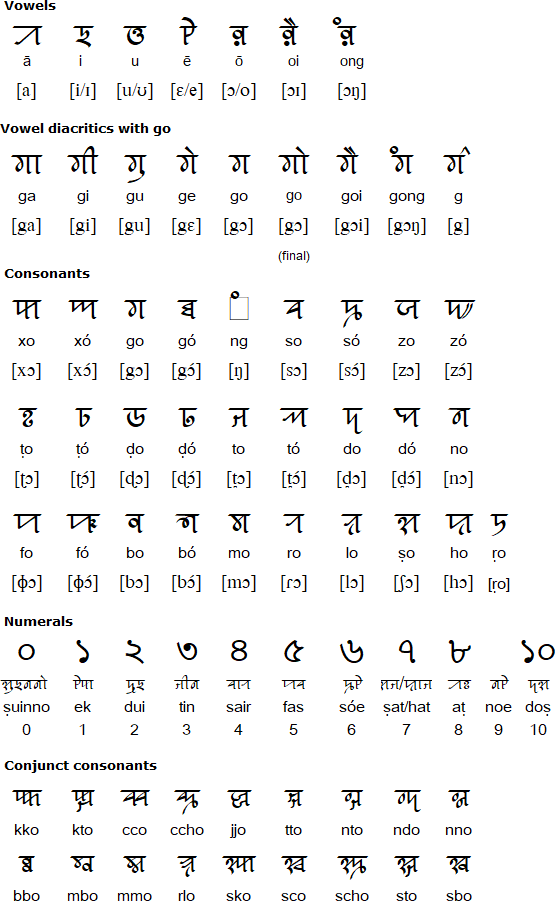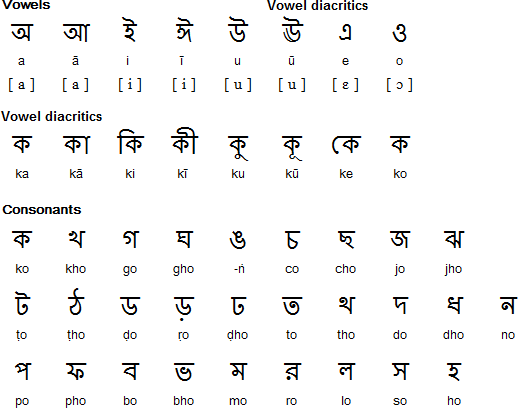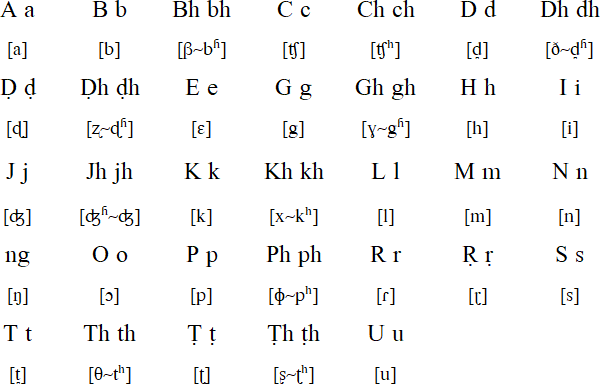Sylheti is an eastern Indo-Aryan language spoken mainly in the Sylhet ( ꠍꠤꠟꠐ / সিলেট) region of Bangladesh, and the neighbouring Barak Valley in the Indian state of Assam. There are also speakers of Sylheti in the Indian states of Meghalaya, Tripura and Manipur, as well as in the USA and UK. In 2007 there were about 11 million speakers.
Sylheti is closely related to Bengali, and most speakers are bilingual in Sylheti and Bengali. It is also related to Assamese.
Sylheti has first written with the Syloti-Nagri alphabet, possibly in the 16th century. It is also written with the Eastern Nagari and Latin alphabets.
 The Syloti-Nagri alphabet is related to the Kaithi alphabet of Bihar. The exact origins of the alphabet are unknown and the earliest surviving manuscripts dates from either 1549 or 1774 (the date is given within the manuscript though the text is not clear at that point).
The Syloti-Nagri alphabet is related to the Kaithi alphabet of Bihar. The exact origins of the alphabet are unknown and the earliest surviving manuscripts dates from either 1549 or 1774 (the date is given within the manuscript though the text is not clear at that point).
The traditionally story of the origin of the Syloti-Nagri alphabet is that it was developed around the beginning of the 14th century by Saint Shahjalal and his 360 saintly companions, most of whom were Arabic speakers. Other scripts used at the time were deemed unsuitable for the Sylheti language.
In the late 17th century, Persian became the official language of the Delhi Sultanate and the Perso-Arabic script was used in all official documents. The Sylheti language and alphabet continued to be used by the ordinary people for everyday matters.
In the 1860s, a Sylheti by the name of Moulvi Abdul Karim spent several years in Europe and learnt the printing trade. After returning home, he designed a woodblock type for the Syloti-Nagri alphabet and founded the Islamia Press in Sylhet Town in about 1870. Other Sylheti presses were established in Sunamgonj, Shillong and Calcutta. These presses fell out of use during the early 1970s. Since then the Syloti-Nagri alphabet has been used mainly by linguists and academics.



Download alphabet charts for Sylheti (Excel)

শব মাইনশর আজাদি জনম ওএ ইজ্জত আর হক লৈআ। তারার হুশ আর আকল-বুদ্ধি আছে আর তারা একজন আরকজনর লগে রুহানি ভাইট্টা বেবহার থাকত।
Shob mainshor azadi zonmo oe izzot ar hox loia. Tarar hush ar axol-buddi ase ar tara exzon aroxzonor loge ruhani baitta bebohar taxto.
A recording of this text by Fakhar Uddin Chaudhury
All human beings are born free and equal in dignity and rights. They
are endowed with reason and conscience and should act towards one another
in a spirit of brotherhood.
(Article 1 of the Universal Declaration of Human Rights)
Information about the Sylheti scripts and pronunciation compiled or corrected by Wolfram Siegel. Sample texts provided by Amuk F..
Information about Sylheti | Phrases | Numbers | Tower of Babel
Information about Syloti-Nagri alphabet and the Sylheti language
http://en.wikipedia.org/wiki/Sylheti_Nagari
https://en.wikipedia.org/wiki/Sylheti_language
https://soasunion.org/activities/society/7438/
Syloti-Nagri fonts
http://www.sylheti.org.uk/page5.html
http://www.wazu.jp/gallery/Fonts_SylotiNagri.html
Sylheti Translation and Research - a London-based research organisation dedicated to studying the folk literature of the Sylhet region of Bangladesh: http://www.sylheti.org.uk
Sylhet Nagri Texts Documentation Archive
http://www.compcon-asso.in/projects/sylhet/
http://www.compcon-asso.in/projects/sylhet/manuscripts/
Bengali and Sylheti Language Services
http://www.bengaliandsylheti.com
Awadhi, Assamese, Bagri, Bengali, Bhili, Bishnupriya Manipuri, Braj, Chakma, Chhattisgarhi, Chittagonian, Desiya, Dhatki, Dhivehi, Dhundari, Fiji Hindi, Gawar Bati, Gujarati, Hajong, Halbi, Haryanvi, Hindi, Hindko, Kannauji, Khandeshi, Konkani, Kotia, Kumaoni, Kutchi, Lambadi, Marathi, Marwari, Mewari, Modi, Nimadi, Noakhailla, Odia, Parkari Koli, Punjabi, Rajasthani, Rajbanshi, Rangpuri, Rohingya, Saraiki, Sarnámi Hindustani, Sindhi, Sinhala, Sourashtra, Sugali, Sylheti, Tanchangya, Urdu
Atong, Bengali, Bishnupriya Manipuri, Bodo, Bhumij, Chittagonian, Garo, Hajong, Karbi, Kharia, Khasi, Koch, Koda, Kokborok, Kurmali, Malto, Manipuri, Mundari, Noakhailla, Rangpuri, Sadri, Santali, Sylheti, Toto, Tanchangya
Ahom, Aima, Arleng, Badagu, Badlit, Basahan, Balinese, Balti-A, Balti-B, Batak, Baybayin, Bengali, Bhaiksuki, Bhujimol, Bilang-bilang, Bima, Blackfoot, Brahmi, Buhid, Burmese, Carrier, Chakma, Cham, Cree, Dehong Dai, Devanagari, Dham Lipi, Dhankari / Sirmauri, Ditema, Dives Akuru, Dogra, Ethiopic, Evēla Akuru, Fox, Fraser, Gond, Goykanadi, Grantha, Gujarati, Gunjala Gondi, Gupta, Gurmukhi, Halbi Lipi, Hanifi, Hanuno'o, Hočąk, Ibalnan, Incung, Inuktitut, Jaunsari Takri, Javanese, Kaithi, Kadamba, Kamarupi, Kannada, Kawi, Kharosthi, Khema, Khe Prih, Khmer, Khojki, Khom Thai, Khudabadi, Kirat Rai, Kōchi, Kodava Lipi, Komering, Kulitan, Kurukh Banna, Lai Tay (Tai Yo), Lampung, Lanna, Lao, Leke, Lepcha, Limbu, Lontara/Makasar, Lota Ende, Magar Akkha, Mahajani, Malayalam, Meitei (Modern), Manpuri (Old), Marchen, Meetei Yelhou Mayek, Meroïtic, Masarm Gondi, Modi, Mon, Mongolian Horizontal Square Script, Multani, Nandinagari, Newa, New Tai Lue, Ojibwe, Odia, Ogan, Pahawh Hmong, Pallava, Phags-pa, Purva Licchavi, Qiang / Rma, Ranjana, Rejang (Kaganga), Sasak, Savara, Satera Jontal, Shan, Sharda, Sheek Bakrii Saphaloo, Siddham, Sinhala, Sorang Sompeng, Sourashtra, Soyombo, Sukhothai, Sundanese, Syloti Nagri, Tagbanwa, Tai Noi, Takri, Tamil, Tanchangya (Ka-Pat), Tani, Thaana, Telugu, Thai, Thirke, Tibetan, Tigalari, Tikamuli, Tocharian, Tolong Siki, Vatteluttu, Warang Citi
Page last modified: 01.06.25
[top]
You can support this site by Buying Me A Coffee, and if you like what you see on this page, you can use the buttons below to share it with people you know.

If you like this site and find it useful, you can support it by making a donation via PayPal or Patreon, or by contributing in other ways. Omniglot is how I make my living.
Note: all links on this site to Amazon.com, Amazon.co.uk
and Amazon.fr
are affiliate links. This means I earn a commission if you click on any of them and buy something. So by clicking on these links you can help to support this site.
[top]